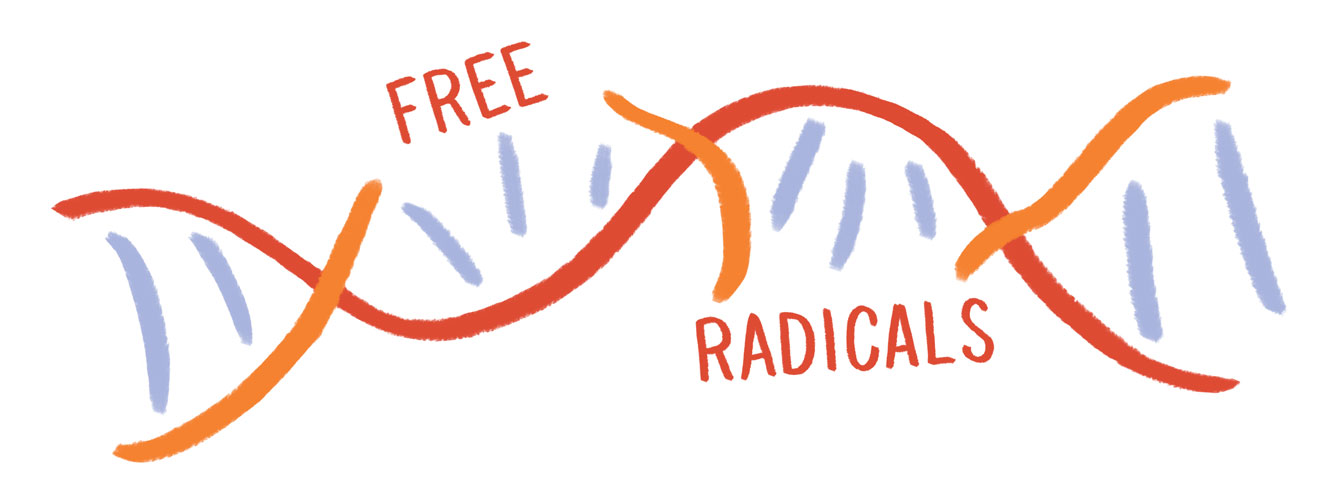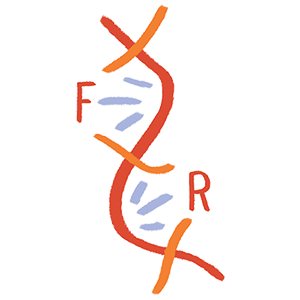
Five people set in front of a large tree. Each is holding a different type of plant in one hand while using smartphones in the other hand to record, measure, and learn about them. Artwork by Hoku Kaahaaina .
The laboratory where I do research is short on funding. The lead research scientist has collected nearly twenty years of invertebrate community data to monitor stream health in an area that the Leviathan Mine, an EPA superfund site, has contaminated since the 1950’s. Yet we cannot gain access to regular funding to further this long-term study. It is imperative that the ecosystems upstream of the Washoe Tribe of California and Nevada have consistent monitoring and remediation, so that clean water and basic health rights are accessible. What is a scientist to do, when the EPA funding is slashed by 30%?
In the presence of a Secretary of Education who [1] praises the U.S. President for deciding to withdraw from the Paris climate accord, [2] oversees federal education funding cuts up to 13.5%, the equivalent of $9.2 billion dollars, and [3] so far has had nine legislative acts at the state level aimed at discrediting climate change and evolution theory in 2017? While the United States government strictly upholds NASA and DOD science funding for a catastrophic “freedom ain’t free” agenda, and cuts irreplaceable funding in sectors like environmental health—can smart phone apps take on a role of supplementing whatever scientific resources may still be accessible? I swiped through over 60 apps to understand their accessibility, scientific utility, and versatility, because while apps won’t be able to replace curricula and research, they certainly can create a fun blast when indulging in science (click here to jump to the reviews).
But Why Smartphones?
Smartphones are becoming increasingly accessible by the year [4] as the age of expensive phone plans is ending. The group with the most ownership of smartphones is 92% of 18-29 year olds. When new technology arises and is only accessible by smartphone, those with smart phones will have the opportunity to increase their literacy in technology. This is a diverging phenomenon. It privileges those with smartphones and their new technological literacy, specifically with smartphone applications, which is valued for activities like daily socializing to job interviews.
How do we overcome this digital divide? Increasing the accessibility of smartphones is one option, for example having them available at libraries alongside computer labs. Sharing resources is essential to reach the full educational potential of smartphone applications, especially when the percentage of people with smartphones is not 100%. Smart phones and science apps won’t save the world, given that 23% of people in the United States don’t have smartphones. The limited accessibility of smart phone applications intensifies digital disparities and brings into question who are these science apps created for and which communities do they exclude? [5]
Science smartphone applications tend to fall into two groups–those that can measure or quantify, and others that share knowledge. They can do work similar to lab equipment like light sensors, accelerometers, and spectrophotometers, or scan the sky for planets and stars, provide free access to academic journals, and help you memorize chemical reactions. In addition to sliding through DM’s, you could discuss climate change with your favorite skeptic neighbor while getting assistance from an app like Skeptical Science! Alas, a lot of scientific knowledge is missing from the science app world, and there is potential to revolutionize how we share and create knowledge, so as long as there is access to these apps.
Science Apps: The Good, the Bad and The Ugly
The criteria for the list of worthy science smartphone applications were that they had to be free, provide sound information, and be user-friendly in a socio-cultural sense. Going through over 60 popular science applications, most were missing the ability to present information in multiple languages, all are Western science centric, and some promoted obvious racial or sexist biases. Some applications are made by consulting firms that have ventures in chemical production and others are software development companies that are promoting apps as a part of a worldwide free education initiative.
Applications are always held accountable for any discriminatory nature, whether it was intended or not. In an app designed for young children to learn addition and subtraction, Math vs Zombies has images of a zombie turning into a blue-eyed, white, blond boy every time a math problem is solved but when the wrong answer is provided the zombie turns to a dark purple with dark brown-skinned hands and dark purple-brown hair. Images of white patriarchy as a reward, are quite problematic. Another app named Molecules, represents a particular blindness when discussing the history of catastrophic chemicals. When looking at the profile for DDT, it omits the information about the horrendous uses of the halogen species during war and in agricultural communities. Rather it applauds the development of such chemicals by mentioning the Nobel Prize that was won for DDT. Lastly, some apps create a façade of being scientific, such as with titles like Science Journal, but share “the latest in science” articles that include sources such as the Christian Science Monitor, instead of credible scientific sources of knowledge.
It must be said that within the app world, there is a dire need for apps that historically, theoretically, and culturally ground the way we learn mathematics, astronomy, physics, biology, geology, and chemistry. There needs to be applications that center indigenous knowledge, provide full applications for free, are accessible in a multitude of languages, and are accommodating for those with disabilities. It especially needs coding applications, which are a springboard for learning how to design apps, because none were found in this study–all existing apps required profile creations and paid subscriptions.
All of the following apps were reviewed by the author, are free, do not require you to make a profile, and are useful for anyone on the scale of tenured professor to curious middle school student.
Apps for Wet Labs, Science Fair Projects, Calculations, etc.
- American Chemistry Society Mobile (Android, iPhone) – Academic article pdfs.
- PLOS Reader (Android) – Academic articles in biology, computational biology, pathogens.
- ReactionFlash (Android, iPhone) – List of all the reactions possible and you can get quizzed.
- Multi Timer StopWatch (Android) – 30+ languages and is helpful for the lab or studying.
- Marine Debris Tracker (Android, iPhone) – Live by a beach, walking on a beach? Report the debris that you find on lists like NOAA, Ocean Conservancy, take pictures and upload. Available in English and Spanish.
- EDDMaps (region specific apps, go HERE to choose your region) – Learn about invasive species all over the US, find your species list in some states, real time tracking of invasive species.
Apps for Astronomy
- Solar Walk (Android, iPhone) – Go to every planet and zoom in and out, time frames pass by.
- Star Walk (Android, iPhone) – You turn your phone around you to see Greek constellations.
- Sky Map (Android) – Greek constellations, star names (numbers), galaxies.
- ISS Spotter (Android, iPhone) – see when Iridiums or ISS satellites come around town!
- Loss of the Night (Android, iPhone) – Helps source the amount of light pollution in your area and teaches you a bit about loss of the night, crowd sourcing of info.
- NASA (Android, iPhone) – Only English, provides news, images, videos, missions, tweets, etc. Lots of history, engineering of NASA. Be wary, NASA is a war-faring organization (lol).
Apps for Observations and Drawing
- Bamboo Paper (Android, iPhone) – You can draw your observations of your environment on your phone.
- Sensors Multitool/Sensors Test Box (Android, iPhone) – Gyroscope, pressure, light, proximity, accelerometer, etc! Everything you need for anything from measuring plant growth under different conditions to mass and acceleration relationships.
Apps for Science Fact Sharing
- Twitter – follow your favorite scientists, science organizations, conferences
- Youtube – need additional material to help with class, want to learn something more in depth? Find lectures on here.
- Science Facts – Lists of 60+ facts in planet, human body biology, chemistry, physics, mathematics, other. Slightly restricted to canonical understanding of what is science.
- App Store/Google Play – If you need to memorize anatomy, do math problems, periodic table, etc, search your app store! There are many for free made by individuals and some are even games to help with memorization.
- The Cell (Android) or Cell World (iPhone) – A tour of the eukaryotic cell, showing structure and function of each organelle.
- 3D Brain (Android, iPhone) – 3D rendered image of the brain, you can search any section of the brain and its particular function.
- Skeptical Science (Android, iPhone) – Have a friend who doesn’t believe in global warming? Provides skeptic arguments, arguments, latest news. You can even report your arguments!
- Overdrive (Android, iPhone) – Download an entire library and gain access to ebooks! Download libraries from around the world.
Applications Centered on Math/Coding
- Math Formulas (Android, iPhone) – Flash card based app that helps you learn math problems.
- Mathspace (Android, iPhone) – For 7 and younger, travel the universe shooting balls at the correct answers to addition, subtraction, multiplication, and division problems. Minimal amount of words, Spanish available.
- *Did not find any useful coding apps, all are monopolized by companies that wanted personal information to sign in or are not as rigorous as one would hope to utilize.
Apps Focused on Environmental Health
- EWG’s Healthy Living (Android, iPhone) – Scan a product or type in its name and it rates the product based on its ingredients list provided allergy, cancer, and developmental concerns
- Air Visual (Android, iPhone) – Air quality based on location and gives suggestions on when to moderate activity
- Dirty Dozen (Android, iPhone) – A little bit of insight on which produce has pesticides and why
[1] http://www.newsweek.com/betsy-devos-climate-change-paris-trump-619781
[2] http://www.npr.org/sections/ed/2017/05/22/529534031/president-trumps-budget-proposal-calls-for-deep-cuts-to-education
[3] https://www.washingtonpost.com/news/answer-sheet/wp/2017/04/22/what-the-latest-assaults-on-science-education-look-like/?utm_term=.30453ed23ffb
[4] http://www.pewresearch.org/fact-tank/2017/01/12/evolution-of-technology/
[5] https://freerads.org/2016/06/14/the-case-against-techno-optimism/





